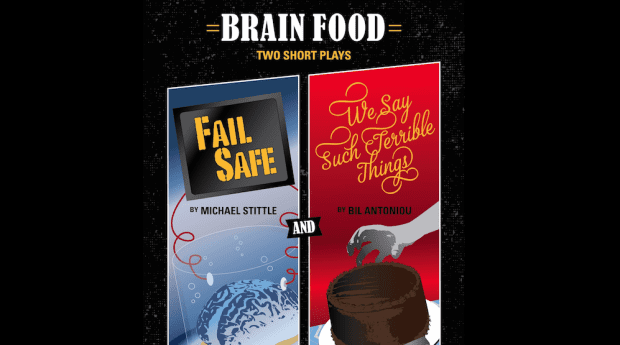At first, the play We Say Such Terrible Things seems like that perennial disaster: The Parade of the Stereotypes. That’s what it should be called when all the gay characters in a play, movie or TV show fall into such categories as cruel queen, naive twink, lecherous old homo or kindly-but-inept fairy.
Showing as part of a theatrical event called Brain Food, Bil Antoniou’s new one-act comedy is about a dinner party. Adam (kindly-but-inept fairy) and his boyfriend Chris (cruel queen) invite Adam’s colleague Donald (lecherous old homo) and Donald’s young boyfriend Elliott (naive twink) for dinner. Chris is critical of Donald’s relationship with Elliott, and when Chris’s equally critical, and far too vocal, friend Benjamin (another cruel queen) arrives, things get out of hand.
Fortunately, there seems to be a point to trotting out these tired stereotypes. The play pokes fun at them (the cruel queens in particular). It also picks them apart to reveal more complex characters beneath — for instance, the naive twink turns out to be insightful and the cruel queens show their softer sides — perhaps as a way to analyse or challenge these stereotypes.
But it’s not all analysing stuff and challenging things. After revealing something deeper about themselves, the characters always swing back to something closer to their stereotypes to lighten the mood. And as tiresome as these types of characters can be, they can also be funny. When they’re written well. Antoniou writes them very well.
Many times during the play I found myself about to roll my eyes — during the predictable Madonna reference, for instance — but stopped as one of the five actors delivered one of Antoniou’s many clever lines, such as “He’s definitely a student; you don’t have to say somebody’s mature when they’re already old.”
The dialogue is impressive, but even if it weren’t, each actor delivers his lines with such nuance, gusto, and impeccable comic timing, that they would still raise the chatter up to something worth going out to see.
With the dinner going from banter to bickering to outright conflict to drunken weirdness, and with characters revealing deeper layers of themselves through bold and brilliantly executed lines, the play is reminiscent of Who’s Afraid of Virginia Woolf?, with much of the fantastic wit and unbearable tension that that entails.
Brain Food runs Wed, March 4–Sun, March 8; and Wed, March 11–Sat, March 14, 8 pm. Red Sandcastle Theatre, 922 Queen St E. $20. redsandcastletheatre.com


 Why you can trust Xtra
Why you can trust Xtra


